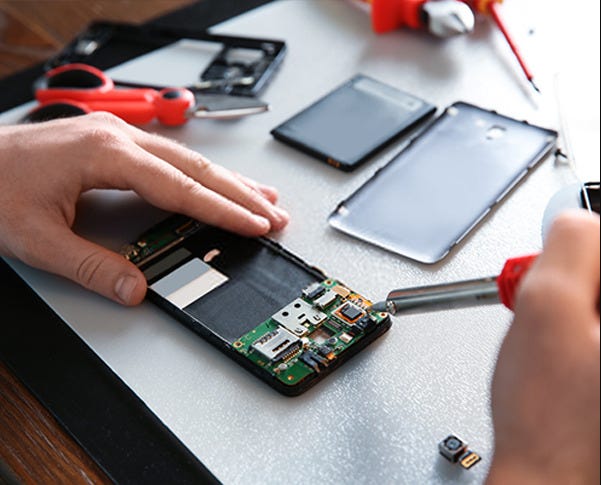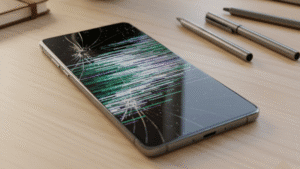Introduction:
When seeking phone repairs, many users focus solely on restoring device functionality, overlooking the critical aspect of data security and privacy. However, entrusting your phone to repair technicians may expose sensitive information to potential risks. In this guide, we’ll delve into the importance of phone repair data security and privacy, along with essential measures to safeguard your personal data during the repair process.

Data Exposure Risks:
Phone repair technicians often require access to your device’s software and hardware components, potentially exposing your personal data, including contacts, messages, photos, and passwords. Without proper safeguards in place, this data could be vulnerable to unauthorized access or theft.
Privacy Concerns:
Your smartphone contains a wealth of sensitive information, from personal photos and messages to financial data and login credentials. Unauthorized access to this information can compromise your privacy and lead to identity theft, financial fraud, or other malicious activities.
Protection Against Unauthorized Access:
To mitigate the risk of data exposure during phone repairs, it’s essential to take proactive measures to protect your device’s data. Set up strong passcodes, biometric authentication, or encryption to prevent unauthorized access to your phone’s contents.
Choose Reputable Phone Repair Services:
When selecting a phone repair service, prioritize reputable providers with a track record of prioritizing data security and privacy. Look for certifications, reviews, and testimonials that attest to the company’s commitment to safeguarding customer data.
Ask About Data Handling Policies:
Before entrusting your device to a repair technician, inquire about their data handling policies and procedures. Ensure that they have protocols in place to secure and protect customer data throughout the repair process, including data encryption, secure storage, and access controls.
Backup Your Data Before Repairs:
Prior to handing over your phone for repairs, back up your data to an external storage device or cloud service. This ensures that you have a copy of your important files and information in case of data loss or unauthorized access during the repair process.
Monitor Repairs Closely:
If possible, remain present during the repair process or request updates from the technician to monitor the handling of your device closely. Verify that only necessary repairs are performed and that your data remains secure throughout the process.
Perform Data Wipe if Necessary:
In situations where you’re concerned about the security of your data or are handing over the device permanently, consider performing a factory reset or data wipe before submitting it for repairs. This ensures that all personal data is erased from the device before it’s serviced.
Follow Up After Repairs:
After receiving your repaired device, thoroughly review its contents to ensure that all data remains intact and no unauthorized changes have been made. If you encounter any issues or concerns, contact the repair service immediately for resolution.

Understanding the Risks
When you take your phone for repair, whether it’s a cracked screen or a malfunctioning component, you’re essentially handing over not just the hardware but also the data stored within. This poses significant risks:
- Unauthorized Access: Without proper precautions, repair technicians may gain access to your personal data, including photos, messages, and other sensitive information.
- Data Theft: In worst-case scenarios, unscrupulous individuals may exploit vulnerabilities in the repair process to steal valuable personal or financial data.
- Data Loss: Incompetent repair procedures or mishandling of devices can result in data loss, leaving you without access to vital information.
Best Practices for Service Providers
Phone repair businesses must prioritize data security and privacy to build trust with their customers. Here are some essential practices:
- Data Encryption: Implement robust encryption protocols to protect stored data from unauthorized access, both during the repair process and while the device is in storage.
- Strict Access Controls: Limit access to customer data only to authorized personnel who require it for the repair process. Implement stringent authentication measures to ensure accountability.
- Privacy Policies and Consent: Clearly communicate your privacy policies to customers, outlining how their data will be handled during repairs. Obtain explicit consent before accessing any personal information.
- Secure Data Wiping: When necessary, securely wipe all customer data from devices before beginning repairs. Use industry-standard data erasure methods to ensure complete removal.
- Employee Training: Provide comprehensive training to your technicians on data security best practices and the importance of respecting customer privacy.
Tips for Consumers
As a smartphone user, you also play a crucial role in safeguarding your data during repair processes. Here’s what you can do:
- Backup Your Data: Regularly back up your device’s data to a secure cloud service or external storage. This ensures that even if data loss occurs during repairs, you have a copy to restore from.
- Disable Remote Access: Temporarily disable remote access features such as Find My iPhone or Android Device Manager before handing over your device for repair. This prevents unauthorized tracking or access.
- Choose Reputable Service Providers: Research repair shops thoroughly before entrusting them with your device. Look for reviews, certifications, and a demonstrated commitment to data security.
- Ask Questions: Don’t hesitate to ask repair technicians about their data security practices and how they handle customer information. A reputable service provider will be transparent about their processes.
- Review Privacy Policies: Take the time to read and understand the repair shop’s privacy policies and terms of service. Ensure they align with your expectations for data protection.
Phone Repair Data Security And Privacy
Phone repair services are essential for keeping our devices functioning optimally, but they also pose inherent risks to our data security and privacy. By following best practices and remaining vigilant, both service providers and consumers can mitigate these risks and ensure that sensitive information remains secure throughout the repair process. Remember, protecting your data is not just a matter of convenience—it’s a fundamental right in today’s digital landscape.
Next time you find yourself in need of phone repair services, remember to prioritize data security and privacy alongside the physical repair of your device. With the right precautions in place, you can rest assured that your personal information remains safe and secure.
Conclusion:
Phone repair data security and privacy are paramount considerations for smartphone users seeking repairs. By implementing proactive measures such as data encryption, choosing reputable repair services, backing up data, monitoring repairs closely, and performing data wipes if necessary, you can minimize the risk of data exposure and protect your privacy throughout the repair process. Prioritize data security and privacy when seeking phone repairs to safeguard your personal information and maintain peace of mind.

Tech tantrums? We’ve got the fix! ????️ laptops ????️ to iPhones ????, MacBooks ???? to iPads, Your one-stop solution for all things digital. From laptops to smartphones, we mend them all! ???? Visit digimob.com.au for swift and reliable repairs. ????
FAQs (Frequently Asked Questions)
1. Is my data safe when I take my phone for repair?
- Reputable phone repair shops prioritize customer data security and privacy. However, it’s essential to choose a trusted repair service with a proven track record of handling sensitive data securely.
2. What measures are taken to protect my data during phone repair?
- Trusted repair shops employ strict protocols to safeguard customer data. This may include password-protected systems, encrypted data transfer, and confidentiality agreements with technicians.
3. Should I back up my data before taking my phone for repair?
- It’s always recommended to back up your data before any repair or service appointment, regardless of the repair shop’s reputation. This ensures that your important files, photos, and personal information are safely preserved in case of unexpected data loss during the repair process.
4. Can repair technicians access my personal information during the repair?
- Professional repair technicians are typically trained to respect customer privacy and are not authorized to access personal data unless required for the repair. However, it’s crucial to clear any concerns with the repair shop beforehand and inquire about their privacy policies.
5. What should I do if I’m concerned about my data privacy during phone repair?
- If you have concerns about data privacy during phone repair, discuss them with the repair shop before handing over your device. Ask about their data handling practices, security measures, and policies regarding customer information. Additionally, consider removing sensitive data from your device or using encryption tools to protect your privacy further.


